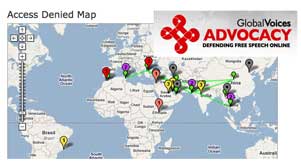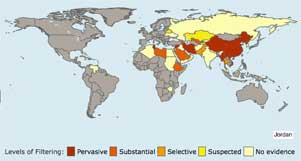 ·GlobalVoices ADVOCACY has a page they call the Access Denied Map. On it they track visually, including pop-up annotations, countries that prohibit access to web sites. ·GlobalVoices ADVOCACY has a page they call the Access Denied Map. On it they track visually, including pop-up annotations, countries that prohibit access to web sites.
The thing that made the biggest impression on me is the number of countries that block bloggers or Flickr. (You can check this yourself by going to their site and clicking the pushpins on their Google map.) |
 ·Opennet.net also tracks blocking/filtering worldwide. They look at the reasons given for filtering and compile maps tracking four different types of filtering. ·Opennet.net also tracks blocking/filtering worldwide. They look at the reasons given for filtering and compile maps tracking four different types of filtering.
|
The end of analog TV will accelerate a paradigm shift
I got there through several levels of indirection, but a post in LINUX JOURNAL by Doc Searls entitled What’s Next for Open Source and Public Media? got me thinking about the impending doom of analog “terrestrial” television in the US and how it may well kill off, as collateral damage, the broadcasting model for TV here in the US. Yes, he gets close to saying this in his post, but I hadn’t thought about it so directly before.
The FCC regulates the airwaves in the US and next year they’re taking back the portions of the RF spectrum that have been devoted to analog television (broadly-separated frequency bands for VHF in the 1950s with a UHF band of frequencies added to that later on), and the broadcast digital television that’s been “under construction” since 1998 will be what’s left. The new technology can carry more channels and information, and much of that in high-definition, but old television receivers will be unable to decode it.
I’d guess that many people simply won’t convert. Cable and satellite TV users won’t be affected and their old TV sets will work, but millions of old analog sets around the US – those who depends on rooftop antennas and rabbit ears – will receive nothing but “snow.”
And where will Mom and Pop Public go?
Faces of Happiness- more community-based art
 We launched a new activity a couple of weeks ago and we hope it will build up over time. Called Faces of Happiness, it’s an interactive process by which the Project Happiness community can create an online photo mosaic based on four key questions and on “your” reactions to them thru photography.
We launched a new activity a couple of weeks ago and we hope it will build up over time. Called Faces of Happiness, it’s an interactive process by which the Project Happiness community can create an online photo mosaic based on four key questions and on “your” reactions to them thru photography.
You play using email and your digital photos. We suggest that you play from a mobile phone, but you can use regular email if your phone doesn’t do photos.
Visit Faces of Happiness to play.
Or just go take a look at the photo mosaic.
See also the Project Happiness blog.
Jane Bay’s day job
I don’t generally engage in hero-worship. But I do sometimes get wound up in interesting people and stories.
And speaking of such, George Lucas is one of the people I’ve only “gotten close to meeting.” So when a group of our Project Happiness students from Mount Madonna School were able to interview him last year (for the Project Happiness movie), I really enjoyed it.
 Well, the “next best thing” to time with George was also really interesting. George’s assistant, Jane Bay, has been with him since just after the first Star Wars film was released. Almost every day she deals with guys like those in the picture to the left. She and I both waited in line to see the film at the Coronet Theater on Geary Blvd. in San Francisco – though a couple of weeks apart. She got a job with George shortly thereafter, and I did not – I remained an academic for a couple more years and then started DesignWare (an edutainment software company), which ended up being my eventual reason for a few visits to Skywalker Ranch. (Continue for the audio interview…) [Read more…]
Well, the “next best thing” to time with George was also really interesting. George’s assistant, Jane Bay, has been with him since just after the first Star Wars film was released. Almost every day she deals with guys like those in the picture to the left. She and I both waited in line to see the film at the Coronet Theater on Geary Blvd. in San Francisco – though a couple of weeks apart. She got a job with George shortly thereafter, and I did not – I remained an academic for a couple more years and then started DesignWare (an edutainment software company), which ended up being my eventual reason for a few visits to Skywalker Ranch. (Continue for the audio interview…) [Read more…]
On “The Power of the Personal – Voice?”
 Rob Paterson writes (today on the FASTForward blog) about The Power of the Personal – Voice? He visualizes this with an Alexa Internet chart/data showing how quickly the recent web sites that allow individuals to broadcast their personal voice have risen.
Rob Paterson writes (today on the FASTForward blog) about The Power of the Personal – Voice? He visualizes this with an Alexa Internet chart/data showing how quickly the recent web sites that allow individuals to broadcast their personal voice have risen.
Most particularly, the data show that Wikipedia rose from zero to “Daily Traffic Rank” of about “10” in about four years, and YouTube rose to “10” in about a year and a half. (Making them among the top sites on the web.)
You’d have to attribute this to the fact that these sites are created by, or at least “formed” in some way by, their users. That belies the suspicion that people are couch potatoes and won’t lift a finger to create their own media entertainment, other than to channel-surf. Yeah, yeah, there’s a lot of channel-surfing going on at YouTube, but there’s also lots of participation, even if 90% of it is deadheaded talking-head responses. And Wikipedia is certainly a creation of its readers (even though there’s a core group that does a huge percentage of the heavy lifting).
So, I want to know if this phenomenon only gives “voice” to those with broad Internet connections, or whether it can be used by those with only occasional access to the net. Can conversation take place offline and then be put online in the form of blog postings, or wikipedia entries or online video? [Read more…]